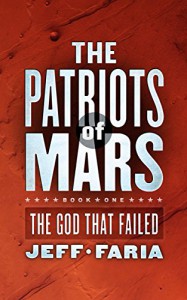

"...All change, all worthwhile human change, comes from the common man. It is never handed down to us from our betters. My goal is to free the common man to effect that change. Sometimes that means enabling him to have a place of his own on Mars. Sometimes it means evening the odds between a nation that can afford War-bots and one that can’t. But as far as trying to figure out who the good guys are, I gave that up a long time ago. That’s a road to nowhere. Don’t go looking for heroes, Josh. You’ll never find one."
I distinctly remember looking at the progress meter on this at 15% and groaning -- it was well interesting, well-written, but I didn't care about any of the characters or the story, and by 15% I should at least have started to get invested in something. I don't say this to beat up on Faria, but to encourage patience in his readers. Because by somewhere in the 20-30% I was glad I stuck with it.
Basically, there's a pretty corrupt government on Earth and a few very powerful transnational corporations (and one that's even more so) who control a small population of miners and other laborers on Mars. Some of those on Mars start to get ideas about self-determination, self-government and whatnot. Throw in a kid who may or may not be having some religious visions that put him right in trouble's way. Tying all of these together is a combination Internet/Simulated Intelligence enabling and supporting communications, and just about everything else in their lives. At some point the kid and some of these people on Mars get together and work toward similar ends -- and that's when everything gets weird.
Faria spends a lot of time setting his dominoes up before knocking them over -- and you'll end up not seeing exactly all the designs he had in mind. Two of the biggest are pretty apparent, but I think he wants you to see those events coming, so that you're smarter than the characters who don't understand their circumstances. It's the ideas floating around these events -- both leading up to them and what comes up in reaction to the various events of the novel that got and kept me interested in this book.
The science fiction part of this is well-done: the mines (why does everyone mine Mars?); the various robots; the Mad Max-ish desert areas of Mars; the political/corporate powers -- even the detail about the ways they messed with the moons of mars to help land ships there -- I ate all that up. My major criticism is the female characters -- there are 3 of them: Josh's mom, Emily, and Emily's mom (who really is just a name for most of the book until she finally shows up). Note that two of those are defined only in terms of their relation to someone (Josh's mom has a name, I'm pretty sure, but it didn't stick with me). You could make the case that Emily is really the only female in the cast, and that's just not right.
I'm not going to get deeper on any of the characters, because at this point, they really don't matter that much -- I think that may change, but let's let my lack of description of them sum up my lack of investment with them.
I'm not sure I cared that much about any of the characters in the end, really. But I want to know what happens to this world -- well, worlds: Earth and Mars -- and the societies represented next. It reminds me of the early Foundation novels that way, you don't get that invested in any of the people, but man, you've gotta find out what happens next.
This feels like the beginning of a trilogy -- and I'm in for the long haul.
Disclaimer: I was given a copy of this novel by the author in exchange for this post. I really appreciate it.






